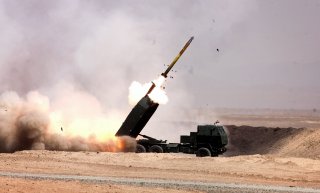The Marine Corps Is Beefing Up Its Anti-Ship Capabilities For Island Warfare
As the Marine Corps girds to fight in the air, on land, and sea, it ought to procure anti-ship weapons in bulk—and in haste.
In short, island-chain defense is strategy on the cheap in relative terms. It’s an approach that would conjure a glint in Andrew Marshall’s eye.
Let’s call it a “Great Wall in reverse” strategy, with islands comprising the guard towers and joint sea power stationed on and around the islands forming the masonry in between. The legendary Great Wall was built to keep out Central Asian nomads who ravaged China from the steppes. Properly fortified, an archipelagic Great Wall can barricade China within the China seas—and thereby force the PLA to compete on allied terms at a fearsome cost to itself.
HIMARS, then, may look like a humble truck. In reality, it is far more: a tactical implement commanding significant strategic import. As the Marine Corps girds to fight in the air, on land, and sea, it ought to procure anti-ship weapons in bulk—and in haste.
James Holmes is J. C. Wylie Chair of Maritime Strategy at the Naval War College, coauthor of Red Star over the Pacific, and author of A Brief Guide to Maritime Strategy. The views voiced here are his alone. This article first appeared last year.
Image: Flickr.

